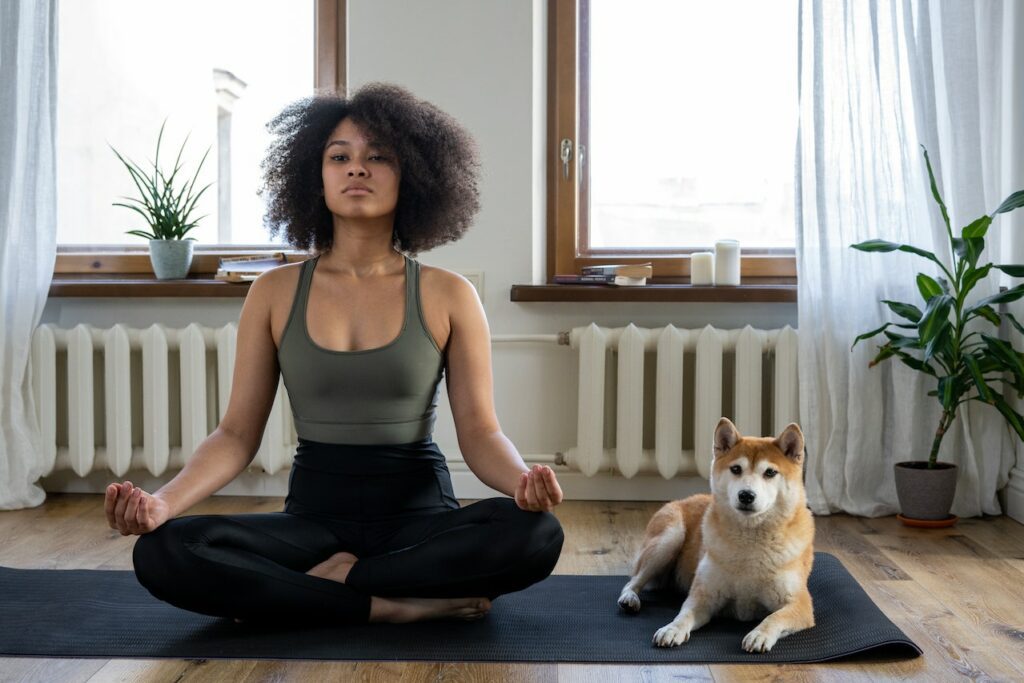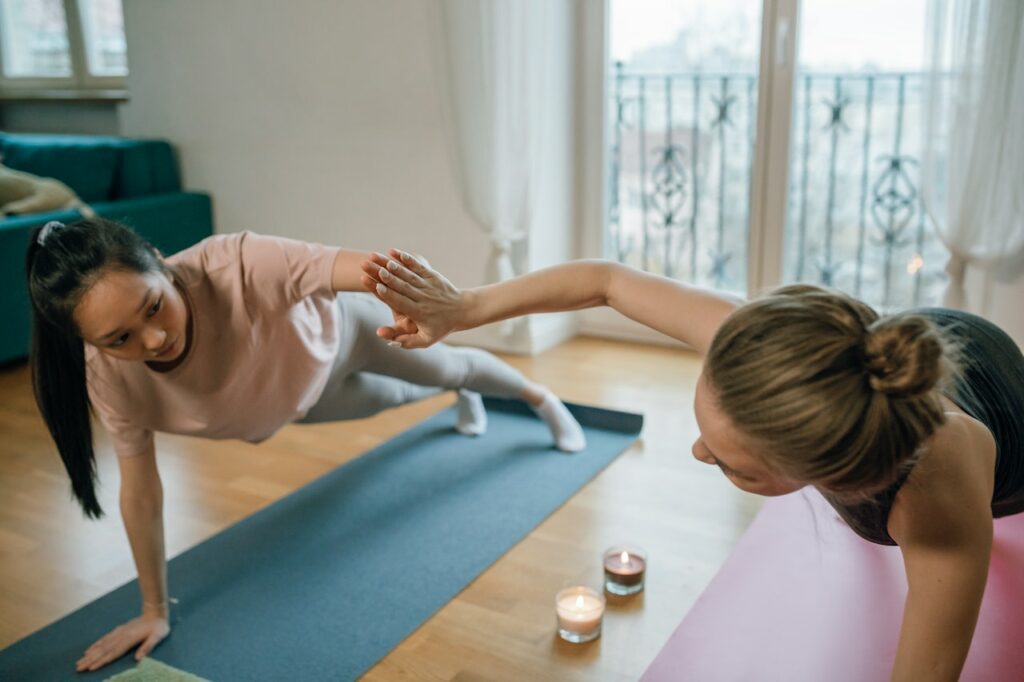Struggling to meditate daily? We’re with you! As life becomes hectic, new habits might be hard to maintain. Meditation may be a daily practice that delivers serenity and quiet with a little effort and the appropriate tactics.
My 60-year-old neighbor Linda struggled to meditate regularly. She started strong, but quickly reverted to missing days and felt bad. After trying numerous methods and building a pattern, she meditates daily for over a year!
If you’re in the same boat, get ready to find out the top techniques to make meditation a regular practice. These methods are based on scientific study and Linda’s expertise.
Meditation may help over-50s decrease stress and increase well-being. It improves cognition, immunological function, and anxiety management.
Join us as we examine seven techniques to make meditation a regular habit, regardless of your experience. Meditation’s numerous advantages may be enjoyed daily with little effort and the correct tactics.

Set a Time
Especially as you become older, scheduling a meditation time might assist you meditate regularly.
Punctuality and setting a meditation time helps you develop a routine. Meditation is easier to include into your daily routine if you plan it. This makes meditation a habit that will eventually become part of your everyday routine. A 2019 Journal of Behavioral Medicine research indicated that selecting a time and location for meditation may help you create a habit.
Scheduled meditation may help you remain responsible and build a habit. This accountability may keep you engaged and devoted to meditation, even on days when you don’t feel like it. Choose a regular time for your daily meditation practice and get the benefits.
The long-term impact? Meditation reduces stress, improves attention, and boosts emotional well-being.
Simplify Your Routine
A basic meditation method that you can easily include in your everyday routine, particularly as you become older, is important to success.
While attempting to form new habits, people frequently overcomplicate things, which might hinder progress. If we overcomplicate things, we may give up before starting. Developing new habits, like meditation, requires simplicity.
Finding a method that works for you and adhering to it makes meditation easy. Just meditating for five minutes a day or reciting a mantra may help. Keeping meditation simple will help you form a habit.
In 2018, Mindfulness released a piece of research that demonstrated basic meditation techniques, including breath awareness and body scan meditation, may reduce stress and improve health. Higher awareness levels were also associated with frequent meditation practice.
Simple meditation helps you prevent feeling stressed. We might become overwhelmed and quit if we attempt to accomplish too much too fast. Keep things basic to gradually build up your meditation practice, adding length or intensity as you feel comfortable.
Creating a basic meditation technique might help you start meditating every day and receive the advantages. Start small, discover your method, and stick to it. Meditation becomes easy with practice.
Get Cozy
Create a warm location to rest and meditate by making it comfy and relaxing. To create a serene atmosphere, add soft couches or blankets, play relaxing music or natural sounds, and use low lighting or candles.
A relaxing setting might help you meditate regularly by making it more pleasurable. Relaxation helps you concentrate on your breath or mantra and let go of distracting ideas and sensations.
A 2017 Frontiers in Human Neuroscience research indicated that a soothing setting improves meditation. A cozy setting increased alpha brain waves, which are connected with relaxation and meditation, more than a neutral one.
A pleasant meditation space might help you build a habit. It’s simpler to meditate regularly when you have a place. This makes meditation a habit that will eventually become part of your everyday routine.
A pleasant location may help you form a regular meditation habit and improve your practice. To rest and meditate, choose a quiet, comfortable place with soft cushions or blankets.
Set Reminders
Set reminders to stay on track, particularly as you become older. This is handy if you forget to take breaks, have a hectic schedule, or want to become more productive.
Lately, more and more people are using technology to stay organized. Various apps, programs, and even games have been found to assist individuals in forming and maintaining healthy habits like exercise and diet.
According to a 2013 Journal of Medical Internet Research research, mobile apps may boost physical activity and health. The research indicated that individuals who tracked their physical activity using a smartphone app were more likely to accomplish their exercise objectives than those who did not.
Reminders might also help you meditate every day. You’re more likely to meditate regularly if your smartphone or smartwatch reminds you. This enables daily self-care and accountability.
All in all, reminders might help you meditate regularly and achieve your objectives. Set a reminder on your phone or wristwatch to meditate simultaneously every day to help you form good habits and remain on track.
Prioritize it
Meditation is frequently put off because we prioritize the wrong things. Yet, emphasizing self-care activities like meditation has been proven to improve well-being.
In 2016, the Journal of Positive Psychology reported that prioritizing self-care activities like meditation increased happiness and life quality. After all, meditation is a form of self-care too – and self-care prioritization reduces stress, anxiety, and unhealthy behavior, according to the research.
Meditation is a mental and emotional health commitment. This requires daily meditation and putting other chores on wait.
Sadly, meditation is often overlooked due to time constraints. Meditation doesn’t need to take long. Even a few minutes a day may improve mental and emotional wellness.
Try to meditate regularly. Find a moment to meditate every day, whether it’s in the morning or before bed. This will help you meditate daily and take time for yourself.

Use a Mantra
Meditation mantras help you concentrate the mind and relax. Mantras may induce calm and serenity, making everyday meditation simpler.
A 2011 Journal of Alternative and Complementary Medicine research indicated that mantra meditation reduces stress and improves well-being. According to the research, mantra meditation reduces tension and anxiety and increases relaxation.
Mantras may also assist novices in meditating. Meditation might be tough at first. Yet, repeating a mantra might help you relax by focusing your attention.
Choose a customized mantra for meditation. This may be “peace,” “love,” or a favorite statement or affirmation. Sit quietly with your mantra and shut your eyes. Repeat your mantra softly, focusing on it. Whenever your attention wanders, slowly return to the chant. That’s it!
Mantras may help you meditate regularly. By relaxing, you’ll be more inclined to meditate and get its advantages.
Try Various Types of Meditation
We can identify the finest meditation method by trying numerous methods. Each meditation style has its own advantages. These are some of the most common meditation styles and their short descriptions:
Mindfulness meditation entails examining your thoughts and emotions without judgment in the current time.
- Transcendental meditation: Repeating a mantra calms the mind and induces profound relaxation.
- Loving-kindness meditation: This entails loving yourself and others.
- Yoga meditation: Physical postures and breathing practices calm the mind and relax.
- Body scan meditation: Focusing on each area of the body, from the toes to the head, helps you relax and become more conscious.
A 2018 Journal of Psychiatric Practice research indicated that various styles of meditation helped alleviate sadness and anxiety. Several methods of meditation reduced stress and increased emotional well-being in the study.
Try numerous meditation methods to discover one that fits your lifestyle. Certain meditation practices may help you relax more or be easier to practice.
Explore several meditation methods to establish a customized, sustainable daily meditation habit. Yoga or mindfulness, there’s a meditation for you.
Your Takeaway
If you made it this far, congrats! Now you’re probably more ready than ever to create a daily habit out of meditation.
I’ve experienced how hard it is to meditate regularly. Meditation reduces tension, improves attention, and calms me.
Whether you’re a novice or an expert meditator, try these tactics. Try various meditations, make a comfy space, set reminders, and keep it easy. Make practicing a daily must-do.
Consistency is crucial to everyday meditation. Even a few minutes a day may improve your well-being, trust me!
Don’t berate yourself if you struggle to practice. Like every journey, meditation has its ups and downs and patience is key to succeeding. Keep practicing, and you’ll eventually meditate regularly.
You might also like: 6 Simple Ways to Practice Gratitude in Your Daily Life









